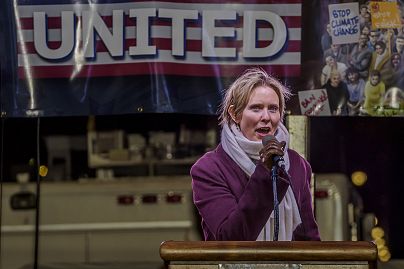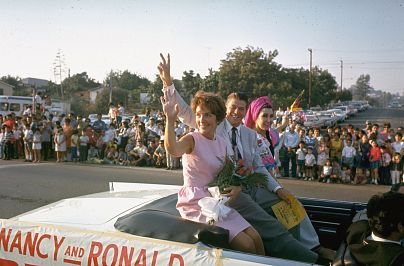Whether or not Nixon can defeat incumbent Andrew Cuomo may depend on how effectively she can bridge two distinct political traditions.
Cynthia Nixon has announced her campaign for governor of New York with a video celebrating her New York identity. As an actor who became famous playing a no-nonsense, fashionable and independent woman on the HBO series "Sex and the City," the parallels between Nixon's launch video — in which she proudly walks through the streets of New York — and scenes from her hit TV program reveal how the star is using her on-screen persona as a proud New Yorker as fodder for her gubernatorial campaign.
With her electoral bid based on progressive politics, Nixon is reviving the liberal left's older tradition of Hollywood political activism. But because she is actively seeking office, Nixon must also apply the tactics that has made the Hollywood right historically so successful at the ballot box.
Liberal celebrities for generations have focused their attention on supporting movements — from civil rights a half century ago to initiatives today like with #MeToo, BlackLivesMatter and #NeverAgain. Yet Hollywood liberals has been notably reluctant to turn celebrity supporters into political candidates — a direct legacy from the post-war period when the Republican Party and Democratic Party cultivated their Hollywood connections in very different ways.
Hollywood liberals have been notably reluctant to turn celebrity supporters into political candidates — a direct legacy from the post-war period.
After the House Un-American Activities inquisition into the industry in the late 1940s, Hollywood liberals retreated from electoral politics and instead focused their energy on "movement politics" and Democratic fund-raising.
But, the Hollywood Right did the opposite. Stars like George Murphy and Ronald Reagan demonstrated the political possibilities of turning conservative politics into electoral bids. They built political networks, worked within the party structures and, most important, popularized a message that resonated with audiences — in hopes this would inspire voter turnout.
Now Nixon's candidacy signals a return to the progressive political tradition that originally propelled the movie industry into the national political debate. The question remains whether she can translate her experience in promoting causes — gay rights and Planned Parenthood, for example — into votes.
It was a California governor's race over 80 years ago that initially inspired the Hollywood Left to mobilize. In 1934, movie moguls launched a smear campaign to defeat the socialist writer Upton Sinclair. Liberals were appalled as they watched their bosses created fake newsreels about the threat of "tramps" invading California to demolish Sinclair's campaign to "End Poverty in California." Sinclair lost the race, and liberal celebrities like screenwriter Phillip Dunne and actor Melvyn Douglas declared "never again."
In response, actors vowed to use their fame to spotlight liberal causes and candidates.
In response, actors vowed to use their fame to spotlight liberal causes and candidates. In a letter to Roosevelt, members of the Hollywood for Roosevelt Committee acknowledged they were political amateurs, but emphasized, they "do not lack political sense." Their mobilization for his 1940 re-election campaign launched a new style of political organization that used publicity, entertainment and benefit concerts to raise money and awareness. The Hollywood for Roosevelt Committee, which took shape in 1940, heralded a new style of political organization that used publicity, entertainment and benefit concerts to raise money and awareness.
World War II intensified the political demand for these left-wing entertainers. Working with the Office of War Information, activist movie stars sold Roosevelt's Four Freedoms on the silver screen. Through the Treasury Department, they raised money for war bonds.
Eager to translate these wartime activities into partisan gain, the Hollywood Democratic Committee (HDC) was formed in 1943. This grass-roots organization was proudly progressive. It wanted to influence state and local politics and promote national issues like civil rights and full employment legislation. Its research council explored potential candidates for election and published its findings in their newsletter, "Target for Today." It organized rallies, like the 1944 event "United We Stand," to push for racial equality in the wake of the violent Zoot Suit Riots, when white sailors clashed violently with Mexican youths. HDC members produced 450 radio spots to encourage voter turnout in primary elections.
World War II intensified the political demand for these left-wing entertainers. Activist movie stars sold Roosevelt’s Four Freedoms on the silver screen.
Throughout the 1944 election, the HDC became a center for coordinating talent for mass meetings and rallies, even offering to appear for candidates outside California — if they were progressive Democrats. The national Democratic Party recognized these innovations in terms of publicity generated. Orson Wells, Humphrey Bogart, Judy Garland, Milton Berle and Frank Sinatra recorded radio spots for President Franklin D. Roosevelt's re-election campaign. Two of their own even ran successfully for office: Will Rogers Jr., the son of the famed comedian, won his congressional seat in 1942 and singer and actor Helen Gahagan Douglas secured hers in 1944.
Roosevelt's death in April of 1945, coupled with Cold War tensions and a newly elected Republican Congress in 1946, however, tore apart the liberal networks that Hollywood had built. The House Un-American Activities Committee hearings the next year were a final blow. Why? Because actors quickly learned that their political activity could undermine their silver screen popularity — and future film options. They realized that their role as entertainers depended on public support at the box office. Though their popularity gave them authority and attention, it also made them vulnerable.
Ultimately, pocketbook concerns and professional pressure won over political ambitions. Bogart penned an embarrassing article asserting, "I'm No Communist." He apologized for his political activities, explaining it was simply because "actors and actresses always go overboard about things." Rest assured, he told viewers, he was simply an "American dope." Edward G. Robinson faced similar pressures. To survive professionally, he wrote, "The Reds made a sucker out of me" to express regret for his past political activities.
The Hollywood Democratic Committee revealed that movie celebrities had something to offer politically, but also showed that entertainers were easy targets for opponents.
The Hollywood Democratic Committee revealed that movie celebrities had something to offer politically, but also showed that entertainers were easy targets for opponents. Publicity was celebrities' path for empowerment — but also their downfall.
In the wake of the HUAC investigations, Hollywood liberal activism was transformed. When the civil rights movement galvanized the nation, some stars like Harry Belafonte became leaders and others like Sammy Davis Jr. and Sinatra raised money and public awareness. But, to much of the Democratic Party, celebrities were viewed as more liability than asset.
Even as the Hollywood Left struggled, conservative entertainers gained standing as anti-communist Cold War warriors and celebrated advisers to President Dwight Eisenhower's administration. The national party was eager to learn from them how to navigate television; it considered celebrities political assets. They engaged in national Cold War policy discussions, helped map advertising strategy and even emerged as candidates. In this context, Murphy and Reagan climbed the ranks of the Republican Party.
When Reagan ascended to the California governorship in 1967, fellow Republicans noted the secret to his success: He had a "a way of stating the issues that was unfailing newsworthy, if not new." Trained in Hollywood, Reagan used his speeches to inspire and connect to the emotions of audience. Or, as Richard M. Nixon observed, his performances "reach the heart," not just "the head."
Democrats, on the other hand, capitalized on the fund-raising power of Hollywood rather than its electoral potential. With HUAC memories still fresh, the national party remained wary of close ties to entertainers. Even Sen. John F. Kennedy, who relied on Sinatra to croon a rally song during the 1960 presidential election — and raise $1.9 million dollars to pay for his campaign — distanced himself from the singer once he was president.
And so, as Republicans recruited actors into their party ranks, Hollywood liberals joined movements. "Stars for Freedom" were key allies and fund-raisers for groups like the Southern Christian Leadership Council, and as historian Emilie Raymond notes, this civil rights activism opened up doors for other types of activism on the left. From Jane Fonda's anti-war travels to Hanoi to John Lennon's rallies for peace and the legalization of marijuana, movement politics relied on celebrity name recognition to raise money for causes, bring attention to political ideas and engage youth through entertainment.
Democrats capitalized on the fund-raising power of Hollywood rather than its electoral potential.
Sure, star power has been on display in Democratic campaigns — from Warren Beatty's "Rock 'n' rhetoric" rallies for George McGovern's 1972 race to Barack Obama's and then Hillary Clinton's star-studded presidential bids. But these entertainers draw attention and raise money for political candidates rather than running themselves. (Al Franken is one notable exception.)
Whether or not Nixon can defeat incumbent New York Gov. Andrew Cuomo may depend on how effectively she can bridge these two distinct political traditions. Her history of activism has certainly prepared her. Like Reagan, Nixon has both experience in movement politics and an effective screen image that can help give shape discussions about key issues like LGBTQ rights, women's health and abortion rights.
The notion of Miranda Hobbs going to Albany has already generated jokes. Articles debate whether the Democratic Party will take her seriously. But, audiences already have, and — as Reagan would attest — that gives her a big advantage.
Kathryn Cramer Brownell is assistant professor of history at Purdue University and the author of "Showbiz Politics: Hollywood in American Political Life."













